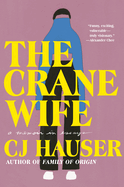
"It has been the work of my life to build slightly firmer boundaries around myself so that I can figure out where I end and the people I love begin," writes CJ Hauser (Family of Origin) in "Hepburn Qua Hepburn," one of the standout pieces collected in the perceptive and witty The Crane Wife. While readers are rooting for Hauser, they won't want her to shore up those boundaries too much: a principal pleasure this book is the fact that she's "a kind of joyful sponge for the affectations and interests of the people I love."
The people from whom Hauser has been soaking up bits of identity are frequently the products of someone else's imagination. In "Hepburn Qua Hepburn," Hauser ruefully explains the significance of one of the eligible bachelors in her longtime favorite film, The Philadelphia Story: "I've spent most of my life dating Macaulay Connors. Because what I believed when I was thirteen, and for many years afterward, was that this was what love was about. This kind of one-soul-seeing-another-soul synchronicity."
The Crane Wife tells the story of a late-30-something woman's lifelong, traumatic-breakup-riddled search for her true romantic and sexual self. Perhaps it was foreordained that the road to romantic fulfillment would be rocky. In "Blood: Twenty-Seven Love Stories," Hauser writes this about her and her sister's inability to keep alive the cacti their parents brought home from a trip for their young daughters: "Our parents exchange a look. As if they know already that love will not be easy for us." But for readers, Hauser's agony is, if not ecstasy, then enchanting. --Nell Beram, author and freelance writer

